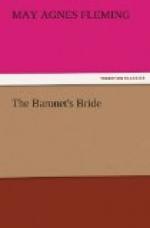“One—from your governess in Paris, I think—and half a dozen for me.”
He glanced carelessly at the superscriptions as he laid them down. But as he took the last he uttered a low cry; his face turned livid: he stared at it as if it had turned into a death’s-head in his hand.
“Oh, papa—”
She stopped in a sort of breathless affright.
Captain Hunsden rose up. He made no apology. He walked to a window and tore open his letter with passionate haste.
His daughter still stood—pale, breathless.
Suddenly, with a hoarse, dreadful cry, he flung the letter from him, staggered blindly, and fell down in a fit.
A girl’s shrill scream pierced the air. She sprung forward, thrust the letter into her bosom, knelt beside her father, and lifted his head. His face was dark purple, the blood oozed in trickling streams from his mouth and nostrils.
All was confusion. They bore him to his room; a servant was dispatched in mad haste for a doctor. Harriet bent over him, white as death. The two young men waited, pale, alarmed, confounded.
It was an hour before the doctor came—another before he left the sick man’s room. As he departed, Harriet Hunsden glided into the apartment where the young men waited, white as a spirit.
“He is out of danger; he is asleep. Pray leave us now. To-morrow he will be himself again.”
It was quite evident that she was used to these attacks. The young men bowed respectfully and departed.
Sir Everard was in little humor, as he went slowly and moodily homeward, for his mother’s lecture.
“There is some secret in Captain Hunsden’s life,” he thought, “and his daughter shares it. Some secret, perhaps, of shame and disgrace—some bar sinister in their shield; and, good heavens! I am mad enough to love her—I, a Kingsland, of Kingsland, whose name and escutcheon are without a blot! What do I know of her antecedents or his? My mother spoke of some mystery in his past life; and there is a look of settled gloom in his face that nothing seems able to remove. Lord Ernest Strathmore, too—he must come to complicate matters. She is the most glorious creature the sun shines on; and if I don’t ask her to be my wife, she will be my Lady Strathmore before the moon wanes!”
CHAPTER XII.
MISS HUNSDEN SAYS “NO.”
Sir Everard found his mother primed and loaded; but she nursed her wrath throughout dinner, and it was not until they were in the drawing-room alone that she went off. He was so moodily distrait all through the meal that he never saw the volcano smoldering, and the Vesuvian eruption took him altogether by surprise.
“Your conduct has been disgraceful!” Lady Kingsland passionately cried—“unworthy of a man of honor! You pay Lady Louise every attention; you make love to her in the most prononce manner, and at the eleventh hour you desert her for this forward little barbarian.”




